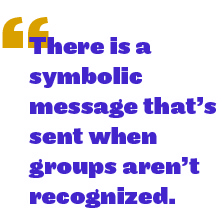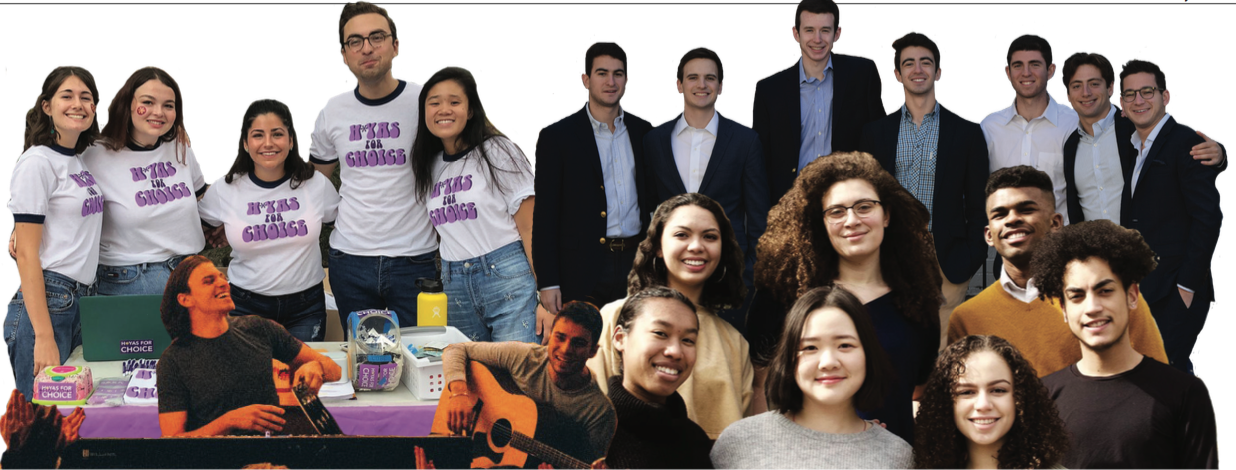String lights and pops of color hung on the walls of the Henle apartment: a portrait of Lupita Nyong’o, old Kober-Cogan building signs, and a miniature basketball hoop. This is where GUCCI, the Georgetown University Collective of Creative Individuals, hosted its first open mic as a recognized student group on Feb. 15. People sat close together on the floor and on couches, all eyes pointed at the front of the room where Brian McGraw (SFS ’19) was singing.
GUCCI is an arts collective that hosts open mics, art shares, and other events to promote student arts on campus. A frequent performer at these open mics, McGraw was recruited to join his band, Right Stuff, at a GUCCI event. “Open mics are big, particularly now, they seem to be growing,” McGraw said. “There’s almost one every weekend now.”
A group of friends formed GUCCI in 2016 but were denied when they first attempted to get university recognition for their club. The Council of Advisory Boards (CAB) deemed it too similar to the Georgetown University Art Aficionados, which, according to their HoyaLink, “host art workshops, student exhibitions, lectures, art themed parties and more.” The Art Aficionados focus on professional arts while GUCCI promotes the work of student artists. GUCCI lost an appeal despite a letter from the head of the Art Aficionados saying that the groups were distinct. But that didn’t stop GUCCI from hosting events.
They tried again for recognition this semester, and this time, they succeeded.
GUCCI’s Facebook group, now 1,400 strong, is filled with posts advertising arts events on campus and around Washington, D.C. GUCCI has held events in apartment living rooms, townhouse basements, and backyards. But now that it is recognized, it can reserve university spaces, request funding, table at CAB fairs, and use the university’s name and logo.
There are about 300 recognized student groups on campus but no official count of the unrecognized organizations who operate without university benefits. Each year, these groups have to decide whether recognition is worth pursuing, and if so, navigate the complicated path to it.
***
Accepting GUCCI to the new club development process on its second try was easy given its established presence on campus, wrote Carley Mambuca (SFS ’19), head of CAB, in an email to the Voice.
Between 20 and 30 student groups apply for university benefits each semester, Mambuca wrote.
Student organizations seeking university benefits must have open membership, at least 12 full-time undergraduate members, a constitution, and be in compliance with university club guidelines. Groups also must not overlap another group’s mission.
As CAB chair, Mambuca administers the New Club Development (NCD) process. The procedure for club recognition begins with attending one of several mandatory information sessions at the beginning of each semester. The groups then submit applications describing their programming, mission statement, membership, leadership, and reasons they need access to benefits.
CAB reviews the applications to make sure potential groups will use finite university resources effectively, Mambuca wrote. The board then decides if a club is either accepted and assigned to an advisory board to begin the NCD process, rejected, or invited to present in front of CAB to answer any lingering questions.
Once accepted into the NCD process, a potential group must develop a constitution, a five-year plan, and host three events, including one in collaboration with another student group and another for the wider university community.
The number of groups accepted varies per semester, Mambuca wrote. This semester, CAB accepted 15 of 20 applicants. In the past, as few as eight of 30 have been accepted in a semester.
Rejected clubs must determine how to proceed: remain unrecognized and operate without access to university benefits, or try again in the future.
***
Mosaic, a club dedicated to empowering and fostering a community for multiracial and multiethnic students, completed the NCD process in spring 2018 following a failed attempt in the spring of 2017.
After submitting the initial application, the group was called to present before CAB. Haley Wint (COL ’20), president of Mosaic, described presenting to CAB “like a pitch, trying to sell an idea of what you want Georgetown to look like.”
CAB allowed the club to move into the NCD process. At the end of the process, Mosaic submitted a final application with proof they had met CAB’s requirements. But some of their required forms were submitted late, and the group was denied full club status.
When they were unrecognized, Wint said, it was hard for them to publicize their events because they didn’t have access to printing.
Mosaic was relegated to the unrecognized groups section at CAB fairs, where student groups recruit new members. They had trouble finding members, so the founders turned to their friends instead.
The Center for Student Engagement (CSE) resources are reserved for recognized groups, which means other clubs must be split from the rest at CAB fairs. Unrecognized groups are allowed to table in Red Square—or the HFSC Herman Meeting Room at indoor fairs—which Mambuca wrote is “more than the CSE is required to do for groups that it does not recognize.”
Mosaic did not have a set budget when it was unrecognized. “We had to be pretty savvy about how many events we were planning throughout the semester and then how much money we were allocating at these events,” Wint said. “Now, it is much easier as a recognized club to get those things done.”
Wint said the experience of being rejected made her wonder whether getting recognized was worth the effort. “Eventually I decided that yes, this is worthwhile, this is worth my time,” she said.
The next semester, the group repeated the NCD process and gained university recognition.
Since being recognized, Wint said that turnout at Mosaic’s events and its name recognition have grown significantly.
Kala Amos (SFS ’19), former president and current treasurer of Mosaic, is pleased with the club’s progress, too. “While the process itself is very difficult and an additional stress on college life, the result is that I have a club that I take pride in,” she said. “I am happy I completed the process, but I don’t think I will be trying to create a second new club anytime soon.”
***
One of the biggest and most visible blocs of unrecognized groups on campus is Greek life.
Around 10 percent of students participate in fraternities and sororities at Georgetown. The only recognized Greek organization on campus is Alpha Phi Omega, a co-ed community service fraternity.
Jack Colavita (COL ’21), president of Alpha Epsilon Pi—AEPi—said his fraternity’s nonrecognition contributes to the stigma around Greek life on campus. AEPi is a Jewish social fraternity with 90 active brothers, although not all are Jewish, and is growing steadily.
The Georgetown chapter of AEPi is recognized by the national organization. But the university does not recognize “single sex groups with ritualized, demeaning, or secret membership practices, and specifically those organizations affiliated with the national Intrafraternity Council, Pan Hellenic Association, and Pan Hellenic Council.”
For the past four years, Jeanne Lord, dean of students, and Todd Olson, vice president for student affairs, have sent an email to the student body expressing the administration’s opposition to Greek life on campus.
“Georgetown’s decision not to support a social Greek system reflects our concerns for the safety and well-being of our students, and is rooted in the values that have animated this university for more than two centuries,” they wrote.
Each year, GUSA has sent an email in response. In their most recent statement on Sept. 30, 2018, they refuted the university’s position that social and professional Greek organizations run counter to Georgetown’s Jesuit values.
“For many, Greek organizations are spaces to find community, enhance leadership skills, and develop into women and men for others,” the statement reads. “By holistically meeting the individual needs of so many Hoyas, our Greek organizations are precisely what the standard of cura personalis demands.”
Colavita said nonrecognition has some benefits—autonomy chief among them—but that its detriments outweigh the advantages.
“If we’re trying to do community service, if we’re trying to do outreach, anything like that, the fact that we can’t get these [university] spaces means that we either can’t do the events that we would like to do, or we have to find ways to partner with other organizations that are recognized,” Colavita said.
He is proud to be a member of AEPi, Colavita said, and he and his brothers try to challenge the popular image of fraternities. “We do everything in our capacity to make sure that it’s safe and respectful to all of the different communities on campus,” Colavita said.
“But I don’t always want to tell somebody that I’m in AEPi because they might take that the wrong way. They might think that I’m a part of a Greek culture that’s toxic or problematic.”

To promote a healthy frat culture, Colavita said, AEPi requires all new members to participate in a SAPE training, in addition to university-wide freshman workshops on consent and sexual assault prevention.
AEPi’s separation from recognized clubs does not mean its members are isolated from other students, Colavita said. The fraternity has developed a close relationship with the Jewish part of Campus Ministry, and there is an overlap in membership between AEPi and the recognized Georgetown Israel Alliance. AEPi has also encouraged its members to live in Bayit, the Jewish Living Learning Community.
Colavita believes the current system of recognition creates a harmful binary—either out or in. “I think that it would be helpful to start considering whether that binary isn’t necessarily the only two options, if there is a third option perhaps to bring these Greek organizations into the fold.”
***
H*yas for Choice (HFC), the unrecognized group which advocates for sexual health and abortion services, has a more complicated view of university recognition.
When the group, then named GU Choice, made its initial push for recognition in 1990, they faced pushback from alumni and others in the Georgetown community for their pro-choice stance. On the condition that it be a discussion-only group, then-Dean of Students (now-university President) John DeGioia briefly granted funding for GU Choice in 1991. But he pulled it 14 months later after the administration deemed their pro-choice advocacy too activist rather than discussion-based.
“Doing any sort of advocacy, providing direct services, the things that we feel really define who we are, was too much for them. They felt that reproductive rights is too much something that conflicted with their values,” said Kory Stuer (COL ’19), vice president of HFC, referring to the university administration.
One of the litmus tests for club recognition is whether a club adheres to the university’s Roman Catholic values. HFC, the university has said, is not in line with these tenets.
“We don’t see any inconsistency between advocating for reproductive justice and ideas of cura personalis, ideas of Hoyas for others,” Stuer said.
The group relies on donations to fund their programs, which include contraception distribution and pro-choice and sex-positive advocacy, their website says. Stuer believes HFC is able to raise much of its money because of university opposition to the group, as donors are more likely to give where they see a need.
Ninety-nine percent of the group’s donations are one-time, so HFC is launching a recurring donations program to make their income more consistent.
Stuer initially had mixed feelings about the proposal. “Isn’t this a bit much that you’re developing basically a non-profit? But unfortunately we have to operate more or less as a non-profit on this campus,” they said. “There are so many needs of the community that Georgetown just won’t fill.”
HFC launched an emergency contraception program in September 2018 which provides Plan B to students. Stuer believes the program exemplifies one of the benefits of being unrecognized.
“We’re able to fill a really important gap that exists on this campus, and there is no way that we would be able to do that if we were recognized. We wouldn’t be able to distribute condoms—never mind emergency contraception,” Stuer said.
The group values the administrative freedom that comes with being unrecognized, but it means they are responsible for managing all of their fundraising efforts and internal operations without a faculty advisor. HFC is also excluded from the bystander intervention training required of student group leaders that teaches students about consent and sexual assault.
Their non-recognition reflects an imbalance of power on campus, Stuer said. The institutions that grant and deny club recognition reinforce the divisions between privileged and marginalized students.
“Most of the things that—for straight students, for white students, for men—that people want on this campus already exist, so they don’t have to worry about starting something new,” Stuer said.
Instead, they argued, marginalized students often have to fight through the NCD process to create groups that reflect their identities while their more privileged peers can join existing groups which are already tailor-made for them.
“There is a symbolic message that’s sent when groups aren’t recognized,” Stuer said. “That this work isn’t valued and also around who does get recognized, around who is and who is not valued on this campus.”
***
The GUCCI open mic was in full swing, and all eyes were on the performers. The crowded Henle living room felt like a personal concert. McGraw believes university recognition will benefit the group without taking away this grassroots energy.
“Going forward we can have some kind of combination of leaky basements and rented spaces on campus, but it’s great to not have to feel like you’re not welcome to hold events on campus,” he said.
GUCCI wasn’t just a group of friends performing for one another anymore. The open mic had the same intimate atmosphere as before, but GUCCI had grown beyond its former limits, coming into its own as a space for Georgetown artists and their supporters.
After everyone who had signed up in advance performed, the hosts turned the mic over to the audience, first-timers welcome.
Emily Jaster contributed reporting.







